
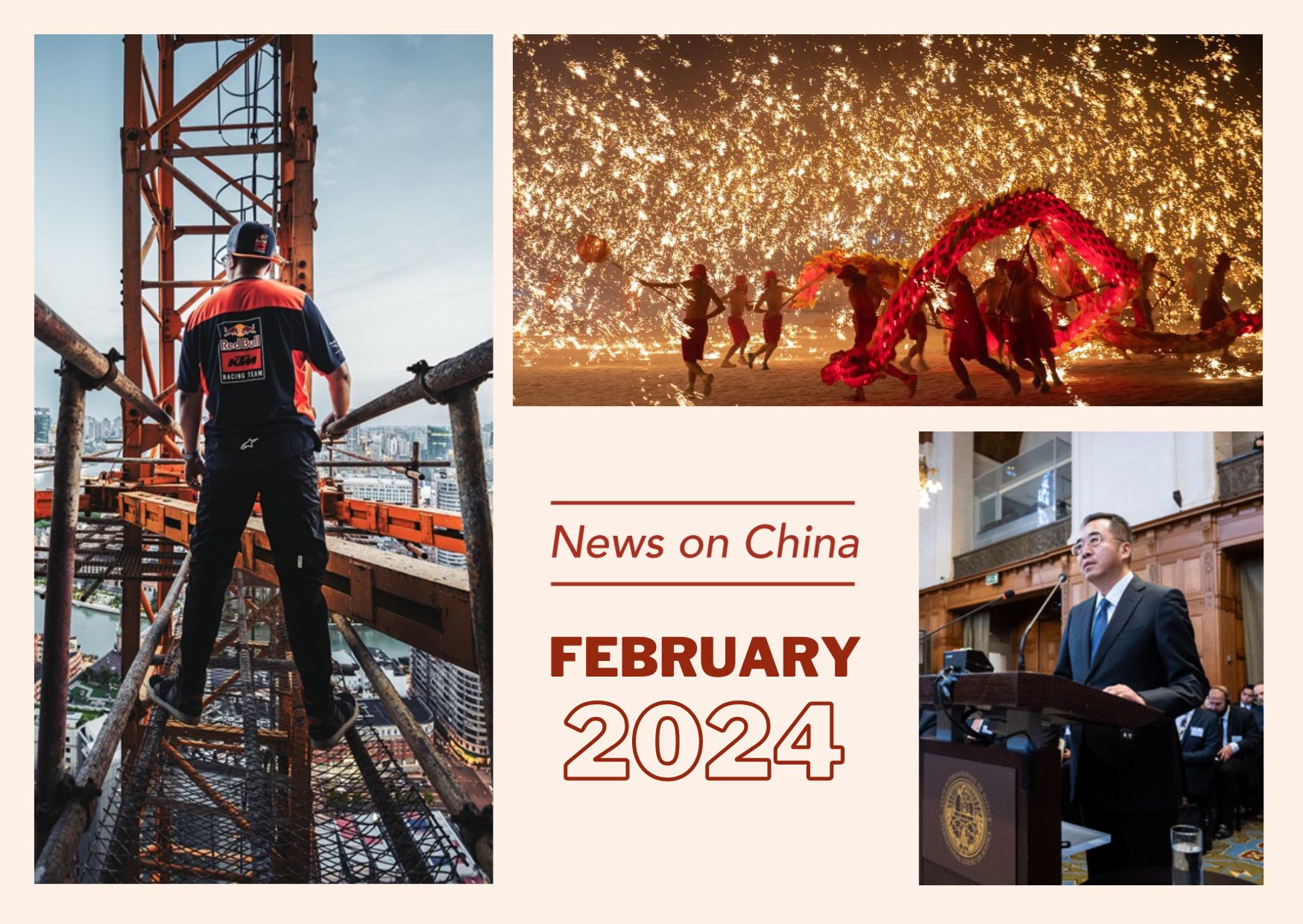
For your listening pleasure, while reading our summary, we recommend Jacky Cheung’s (张学友) Stealing Your Heart (偷心), an old popular song that has had a revival thanks to the TV series Blossoms Shanghai.
If you’re short on time, here’s what you need to know:
- China stands for Palestine’s right to armed resistance
- 474 million trips taken during the Chinese New Year
- Sanctions against Russia hit Chinese companies for the first time
- New wave of BRI investments in Africa
Genocide in Palestine
As Israel continues to carry out a genocide of tens of thousands of Palestinians, with the full support of the US, expectations are rising for more forceful action from China to guarantee a ceasefire in Gaza. Analysts point to possible economic sanctions on Israel as a possible instrument of pressure, since diplomatic pressure at the UN has had no effect. But the Chinese government surprised the world last week when Ma Xinmin, the Foreign Ministry’s legal advisor, spoke at the International Court of Justice. For Beijing, based on numerous precepts of international law, the Palestinians have the right to armed resistance in the face of the colonialist actions of the State of Israel. Therefore, organizations like Hamas could not be labeled as terrorists.
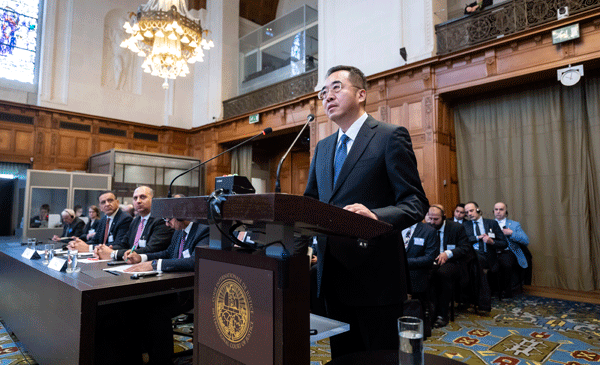
Ma Xinmin at International Court of Justice [Ministry of Foreign Affairs of PRC]
China’s strongest statement on the Palestinian issue came just four days after Brazilian President Lula da Silva compared the genocide in Gaza to the genocide practised by the Nazis against the Jews in the Second World War, generating much support but also much criticism around the world. The timing of the two statements could indicate a possible articulation between the two countries in search of a solution to the humanitarian tragedy in Palestine, but it’s still too early to draw conclusions.
Lessons from Russian sanctions
The thirteenth round of EU sanctions against Russia has for the first time hit Chinese companies – 3 companies from mainland China and 1 from Hong Kong – accused of facilitating Moscow’s access to dual-use European equipment (civilian and military). They will be banned from doing business with the EU. The three mainland Chinese companies are Guangzhou Ausay Technology Co Limited, Shenzhen Biguang Trading Co Limited, and Yilufa Electronics Limited, which were also targeted – along with 14 other Chinese companies – in the new round of US sanctions over the Russian government’s alleged involvement in the death of right-wing leader Alexei Navalny, who flirted with neo-Nazism.
Despite enduring thousands of sanctions over the last two years, the Russian economy continues to show resilience. Last year, it grew by 3.6% (it had fallen by 2.1% the previous year) and became, according to the Russian government, the largest European economy in terms of purchasing power parity. Last month, the IMF more than doubled its growth forecast for Russia for 2024, from 1.1% to 2.6%.
According to Chinese economist Ding Yifan, former deputy director of the World Development Institute, which is part of the State Council’s Development Research Centre, China can learn important lessons from Russia on how to resist the sanctions of the Western powers, which could hit China more and more in the coming years. Among the main measures, said Ding, are the use of alternative currencies to the dollar, increasing trade with “friendly nations”, and controlling capital flight.
Trade between Russia and China, for example, is now predominantly in rubles and yuans. Russia’s trade with the EU plummeted by 68% last year (to US$84.9 billion), while its trade with Asia grew by 5.6% (to US$306.6 billion), with new levels recorded with China (US$240 billion) and India (US$65 billion). 84% of Russia’s total energy exports went to “friendly countries”. Finally, Moscow has also endeavored to attract investment from these countries in order to guarantee the security of its domestic supply chains. According to Ding, “….this is a very important message for China too”.
Wang Yi in Europe, German FDI into China
In the same week that EU sanctions hit Chinese companies, Chancellor Wang Yi visited France, Spain, and Germany. In Germany, he took part in the Munich Security Conference, where he defended military cooperation with Russia and once again drew the red line on Taiwan. He also said that the conditions to return to the negotiation table on the Ukraine conflict are not mature yet.
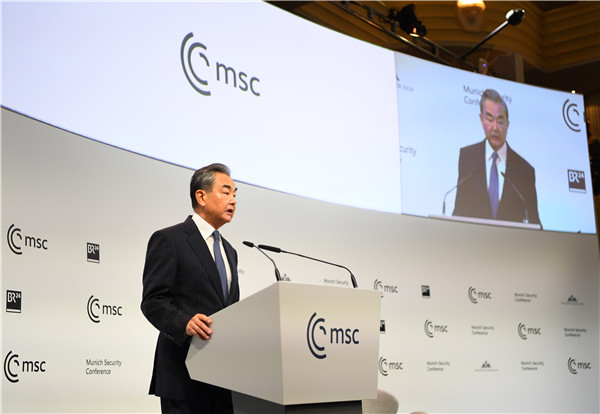
Wang Yi at Munich Security Conference [Ministry of Foreign Affairs of PRC]
In Paris, where he met French President Emmanuel Macron, Wang said that “China supports Europe in strengthening its strategic autonomy and holding its future in its own hands”. Both countries agreed to expand cooperation in nuclear research and in the energy, space, and aerospace sectors, while Xi Jinping is considering a visit to France in the spring.
On his visit to Spain, Wang met with Spanish President Pedro Sanchez and Chancellor Jose Manuel Albares Bueno and announced that Beijing will lift the embargo on Spanish beef, which had been banned from China since 2000 due to the “mad cow” outbreak.
Lately, the German government has been raising the tone and tensions with Beijing, exemplified by a report published in July calling on large German companies to reduce their dependence on China. However, it seems that the big German companies are not willing to follow Berlin’s line. German FDI in China hit a record high in 2023, reaching almost US$13 billion. The Chinese share of total German investments was 10.3%, the highest since 2014, and this trend is set to continue. According to a survey by the German Chamber of Commerce in China last month, 73% of large German companies operating in China intend to increase their investments over the next few years. However, giants such as Volkswagen and Bayer are considering withdrawing their investments from Xinjiang in the face of Western accusations of using forced labor in the Uyghur Autonomous Region, something that Beijing vehemently denies.
But it’s still ironic: while Germany is deindustrializating and fell into recession thanks to its decision to give up cheap Russian energy, its big companies are increasing their bets on Chinese industrialisation.
New wave of BRI investments in Africa and Zambia debt deal
Beijing seems to be reversing the trend of decreasing investment in the New Silk Road as seen during the pandemic. Motivated mainly by the search for minerals for industries linked to the energy transition, also known as the “New Three” (electric vehicles, batteries, and renewable energies), Chinese companies increased their investments on the African continent by 114% in 2023, totalling US$21.7 billion, surpassing the Middle East, which saw investments of US$15.8 billion.
Experts predict a further increase in investment in 2024, but still lower than the 2010-2015 period, partly due to the level of indebtedness of some countries on the continent, such as Angola, Cameroon, and Kenya.
Speaking of debt, the Zambian government has finally reached an agreement to renegotiate its debt with China, its biggest creditor, and India. Some conflicts of interest between Beijing and Western private creditors took time to resolve. With a total of US$13 billion in foreign debt, the African country declared a moratorium in 2020 and is now trying to secure agreements with its creditors that will allow it to access a US$1.3 billion IMF bailout. Zambia is betting on a resumption of investment in its greatest asset, copper, in order to return to economic growth.
China and India ease tensions
In addition to their cooperation in Zambia, and as a result of a high-level meeting of their military commanders, Beijing and New Delhi have agreed to “turn the page” and resolve the tension on the border “as soon as possible”. The aim of the talks is to ensure the complete withdrawal of troops along the Line of Actual Control in eastern Ladakh, according to the Indian Foreign Ministry.
Border conflicts between China and India have caused dozens of deaths on both sides in recent years and, according to many analysts, tensions between the two countries are considered one of the main obstacles to progress on some of the BRICS10’s strategic issues.
Mexico surpasses China in exports to the US, but…
For the first time in 20 years, Mexico has overtaken China as the largest exporter of goods to the US. Mexican imports to the US grew by 5% year-on-year to US$ 475.6 billion, while Chinese imports plummeted by nearly 20% to US$ 427.2 billion. As a result, the US deficit with Mexico reached US$ 172.4 billion (up 17%), while with China, the US deficit fell to US$ 279.4 billion (down 27%), or the lowest since 2010.
However, a more detailed analysis of the data shows that this is partly due to a tactic by Chinese companies to circumvent the high tariffs imposed by the Trump administration on a long list of goods from the Asian giant. According to an analysis by the Financial Times, China shipped 881,000 20-foot containers in the first three quarters of 2023, while it had shipped 689,000 in the same period in 2022 and around 500,000 in the whole of 2017, before the start of Washington’s tariff war against Beijing. As Mexico has a free trade agreement with the US, its exports pay little or no tax.
For example, cars imported into the US from Mexico pay a tariff of 2.5 per cent, while auto parts can pay between 0 and 6 per cent. Cars and auto parts imported from China, on the other hand, pay no less than a 25% tariff. Between 2021 and 2023, 33 Chinese companies operating in Mexico increased their exports of auto parts to the US from US$ 711 million to US$ 1.1 billion. The same mechanism is being exploited by China through countries like Vietnam, Singapore, and the Philippines. Officials in Washington have realized this and promise to take action, but it won’t be easy.
Two Chinese fishermen drowned after being chased by Taiwanese maritime forces
Two Chinese fishermen drowned off the coast of Kinmen – a group of islands 6 miles from the Chinese mainland – after being chased by Taiwanese maritime forces on Wednesday the 14 of February.
According to the Taiwanese Coast Guard Administration, the unnamed and mainland-China registered boat had crossed a maritime border and failed to stop for an inspection, and instead sped away from the coast guard’s patrol. During the pursuit the fishing boat capsized and four of its crew members fell into the sea, two members of the crew were rescued while the other two lost consciousness and died.
Taiwan’s Coast Guard Administration stated that it regretted the “unfortunate” deaths of the fishermen.
According to the Taiwan Coast Guard Administration this is its first incident resulting in deaths and is a result of the refusal of the fishing crew to cooperate with the coast guard patrol.
‘China’s Spokesperson for the Taiwan Affairs Office, Zhu Fenslian, condemned Taiwan for its conduct which Zhu described as “vicious”, highlighting that the deaths occurred during the Chinese New Year celebrations. Zhu stated that the incident is a result of the long trend of Taiwanese Coast Guard officials mistreating fishermen from the mainland and forcefully and dangerously seizing mainland fishing boats.
Zhu cautioned Taiwan to respect the fact that the Taiwan Strait is used by fishermen from the mainland and to conduct maritime operations in such a way that would ensure the safety of mainland fishing crews.
The deaths of the fishermen is reminiscent of two deadly maritime disasters involving the Taiwanese authorities and mainland Chinese fishermen which made headlines in 1990. The first involved 25 Chinese migrants suffocating to death after being forced into boat cabins that were sealed shut while they were going back to mainland China. Two weeks later, a fishing boat with 50 Chinese migrants was rammed by a Taiwanese naval vessel, killing 21 on board the fishing boat.
The Chinese real estate sector stepped back in 2023
For the second consecutive year, the revenue from land sales fell by 13.2%, their lowest level since 2017; and the residential floor space sold totaled 940 million sq. meters, down about 40% from its peak in 2021.
Intense price-cutting competition is underway as the country’s housing market becomes saturated. The excess stock reached just under 5 billion sq. meters at the end of 2023, which on average equals to about 50 million homes.
To stimulate demand and facilitate liquidity for real estate developers, the PBoC lowered the five-year loan prime rate, a mortgage benchmark, to 3.95% from 4.2%. Shanghai-listed stocks rose in response to the move.
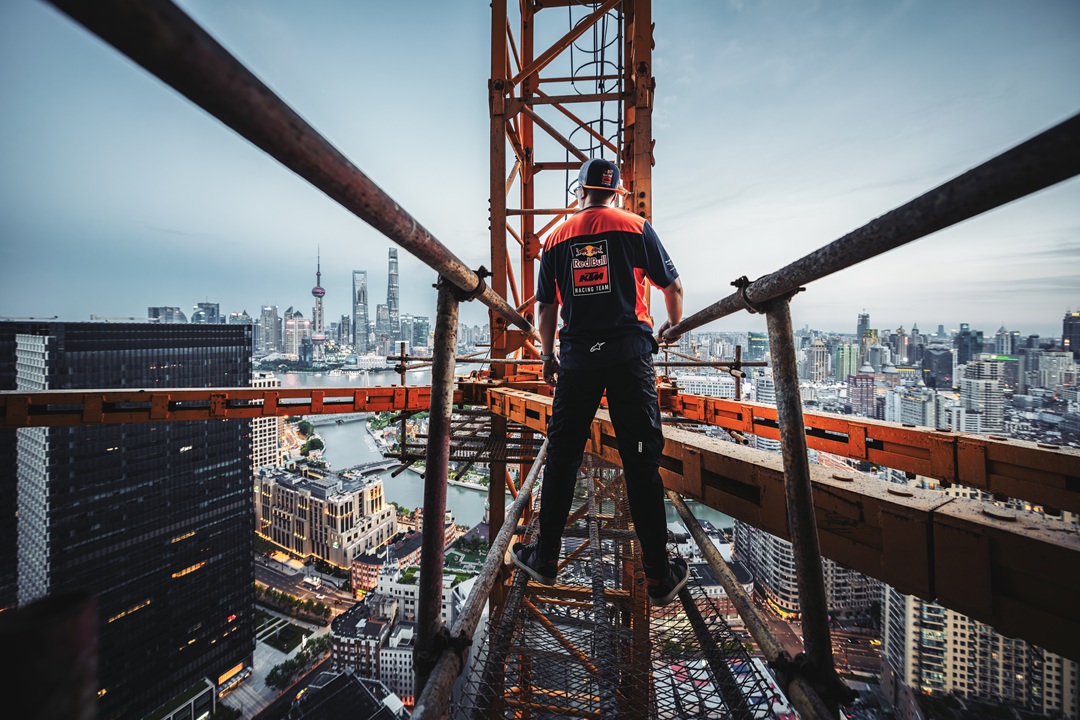
A real estate construction site in Shanghai [VCG]
China announces a “New Model” to address real-estate sector challenges
The new model, a top objective for 2024, focuses heavily on state-provided affordable housing. Under the new strategy – announced at a meeting presided over by President Xi Jinping in December – the State would take over a larger portion of the real estate market, which for years has been dominated by the private sector.
The strategy comprises two principal programs: the first is the state purchasing distressed private-market projects and converting them into homes that the government would rent or sell. The second calls for the state to build more subsidized housing for low and middle-income families.
The aim is to increase the share of housing built by the state for low-cost rental or sale under restricted conditions from 5% today to at least 30% of China’s housing stock. Initial plans call for providing six million affordable housing units in 35 cities with more than three million people each over the next five years. The estimated budget for the model is US$1.4 trillion over the next five years or US$280 billion annually.
The People’s Bank of China has allocated US$70 billion in low-interest financing to policy banks. 70% of the US$70 billion has been distributed amongst the China Development Bank, the Export-Import Bank of China, and the Agricultural Development Bank of China. The China Development Bank approved a 202 million yuan line of credit to the city of Fuzhou, which will be used by the local government to construct 701 housing units at a subsidized cost by 2026 for low-middle-income families.
China’s real estate sector, which accounts for 25% of China’s GDP, has been a major contributor to Chinese economic growth. 90% of households in China own their homes, as compared to 66% of US households. With millions of unoccupied apartments in China in need of funding, Chinese Vice Premier He stated that to avoid the collapse of banks – due to property loans worth billions of dollars – the central government could absorb and revitalize the surplus housing stock and stabilize dropping prices. The China Development Bank loaned 10 million yuan to Hunan Province to build government housing in an abandoned inner-city area.
Foreign Direct Investment hit 30-year low
Net FDI into Mainland China fell in 2023, but there are two different estimations made by governmental agencies.
According to the SAFE (State Administration of Foreign Exchange), FDI reached US$ 33 billion – the weakest figure since 1993 – down roughly 80% from 2022.
A different way of measuring overseas investment released by the Ministry of Commerce showed that total utilized FDI in China tumbled 8% to US$ 156.1 billion.
Chinese New Year: the largest domestic mobilization in the world
As with every year, the seven-day Chinese New Year holiday, also called Spring Festival, mobilized millions of Chinese people. According to data from the Ministry of Culture and Tourism, 474 million trips were registered, an increase of 34.3% compared to the previous year, which was the first year after the pandemic restrictions were lifted.
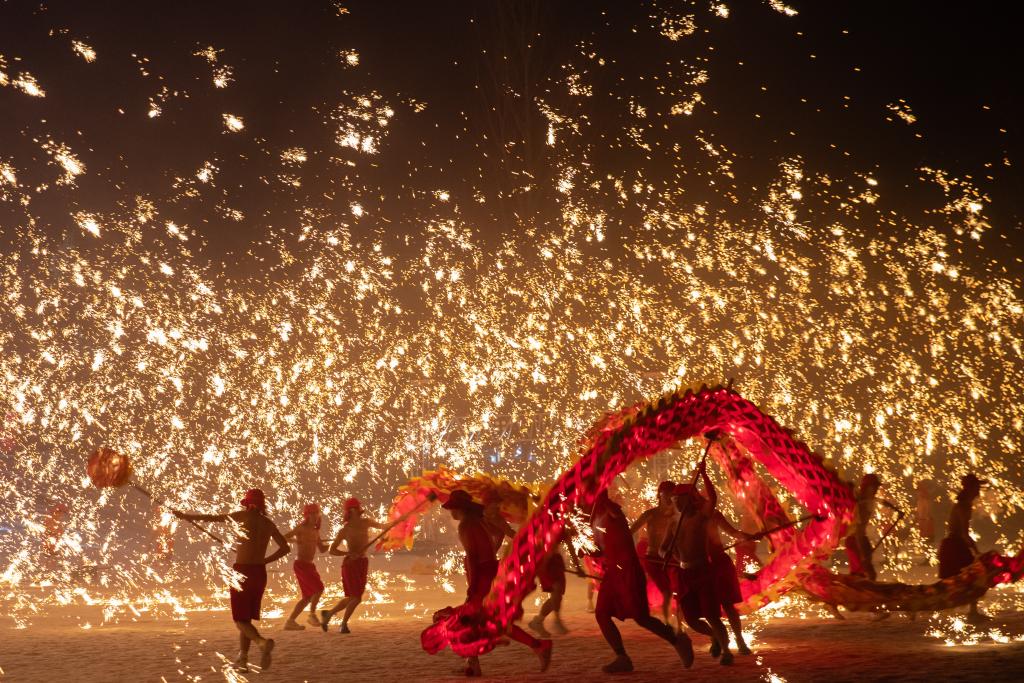
Actors perform a fire dragon dance in a shower of molten iron [Xinhua/Zhang Tao]
The Spring Festival, which fell on February 10 this year, is China’s biggest traditional festival. This year’s Spring Festival travel rush started on January 26 and will end on March 5.
Beijing, Xi’an, and the Guangdong-Hong Kong-Macao Greater Bay Area were among the most popular tourist destinations. Touring museums and visiting grottoes, temples, and other historical and cultural places were highlights of this year’s Spring Festival. Harbin, a northeastern city in China’s rust belt, saw a record high in tourist arrivals during the holiday, with over 10 million visitors, largely driven by tourists from China’s southern regions, generating revenue of 16.42 billion yuan, a year-on-year increase of 235.4% based on a comparable basis. Dubbed China’s “ice city,” Harbin boasts abundant winter tourism resources and a longstanding tradition of celebrating ice and snow culture spanning over 60 years.

Harbin Ice-Snow World in northeast China’s Heilongjiang Province [Xinhua/Wang Jianwei]
The railway sector reported 15.16 million passengers on February 15, setting a record for daily passenger numbers during the Spring Festival travel rush period. An additional 1,813 passenger trains were scheduled for the travel rush.
Following an unprecedented surge in travel during the holiday – which left thousands of visitors stranded – authorities in southern China’s Hainan province announced increased flights, introduced new ferry and shuttle services to major airports, and reopened parking bays at Sanya Phoenix International Airport, the island’s second busiest airport.
Hainan handled a record-breaking 1.69 million trips, marking a historic high in passenger numbers at the province’s three major airports.
According to China’s wuxing (five elements) culture, 2024 will be the Year of the Wooden Dragon. The dragon symbolizes power, nobility, and intelligence, and combined with wood implies growth, development, and prosperity. The dragon, one of the twelve signs of the Chinese zodiac, is not only very important within China but also to millions of people around the world.
The dragon is one of the favorite zodiac signs in Chinese culture, so much so that health workers and experts expect a small boom in births. Not only because it is the year of the dragon but also because of a post-pandemic fertility rebound and increased fertility support policies.
YOLO and body image debates inside China
Thanks to the holiday, the Chinese box office receipts set new records to surpass the world’s cinema revenues, exceeding US$ 1.1 billion, an 18% increase over 2023 and surpassing the 2021 record.
YOLO, which takes its name from the acronym for “you only live once” in English, is a drama about a female boxer. It is the highest-grossing movie so far this year and sparked strong debates on social media because of the star’s dramatic weight change. Jia Ling, the successful actress and director who also starred in the Chinese 2021 blockbuster “Hi, Mom,” first gained 20 kg and then dropped 50 kg for the film. This is not very common among Chinese actors and generated controversy as to what kind of message such an abrupt weight change conveys.
In recent years, netizens expressed concerns over her health due to her growing weight, but they have also judged and criticized her, even likening her to “a balloon about to explode”. That’s why many were surprised by her transformation from a once plump and bubbly comedian into a muscular, strong, and healthy physique. Jia has clarified that her film does not center on weight loss or aim to perpetuate body image concerns but rather is about portraying the mental and physical transformation of her character, a jobless, people-pleasing, and socially isolated woman who turns to boxing to enjoy and control her own life, and telling the audience that it’s never too late to change and love your life. Jia’s decision to lose weight was also influenced by a desire to break free from typecasting because of her previous body shape.
The film has further fueled the fitness craze, especially the enthusiasm for women’s boxing. According to the data from Meituan, China’s online retail platform, since the movie premiered on February 10th, searches related to “boxing” have increased by 388.4% compared to last year’s Spring Festival period. Search volumes for keywords like “adult boxing”, “boxing class”, and “female boxing” have surged more than tenfold compared to the previous year. So far, the film has been enjoying great success, grossing over three billion yuan by Feb 20.

A scene from YOLO, reflecting the physical change of the protagonist
Subscribe to News on China. The digest is published every Saturday in English, Spanish, and Portuguese.
Follow our social media channels:
- Twitter: @DongshengNews
- Telegram: News on China
- Instagram: @DongshengNews
- YouTube: Dongsheng News
- Facebook: Dongsheng News
- TikTok: @dongshengnews





